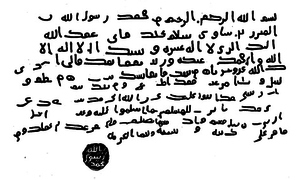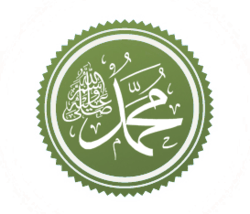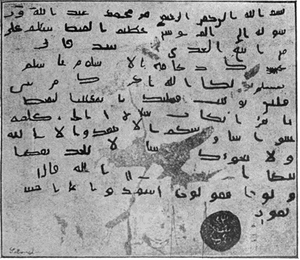Muhammad's letters to the Heads-of-State
- This is a sub-article to Muhammad in Medina.
| Part of a series on |
| Muhammad |
|---|
|
Views |
|
Perspectives |
|
Related |
|
According to al-Tabari in his History of the Prophets and Kings, Muhammad decided after the Treaty of Hudaybiyyah to send letters to many rulers of the world, inviting them to Islam. [1][2][3] Non-Muslims have disputed this tradition, however.[4]
Muhammad, according to the usually told Islamic historiography, sent ambassadors with such letters to Heraclius the Caesar of Byzantium, Chosroes II the Khosrau of Persia, the Negus of Ethiopia, Muqawqis the ruler of Egypt, Harith Gassani the governor of Syria, Munzir ibn Sawa and to the ruler of Bahrain.[5]
To the Byzantine emperor

The text of the letter to Heraclius, as transmitted by Muslim historians, reads as follows:
| “ | من محمد بن عبد الله إلى هرقل عظيم الروم: سلام على من اتبع الهدى، أما بعد فإنى أدعوك بدعوة الإسلام . أسلم تسلم ويؤتك الله أجرك مرتين ، فإن توليت فإن عليك إثم الأريسيِّين.
{قُلْ يَا أَهْلَ الْكِتَابِ تَعَالَوْا إِلَىٰ كَلِمَةٍ سَوَاءٍ بَيْنَنَا وَبَيْنَكُمْ أَلَّا نَعْبُدَ إِلَّا اللَّهَ وَلَا نُشْرِكَ بِهِ شَيْئًا وَلَا يَتَّخِذَ بَعْضُنَا بَعْضًا أَرْبَابًا مِّن دُونِ اللَّهِ ۚ فَإِن تَوَلَّوْا فَقُولُوا اشْهَدُوا بِأَنَّا مُسْلِمُونَ} [سورة آل عمران : 64]. In the name of God, the Most Merciful, the Bestower of Mercy From Muhammad, son of Abdullah to Heraclius the Leader of the Romans: Peace be upon he who follows the guidance. Furthermore, I invite you with the invitation of Islam. If you accept Islam- you will find peace, God will give your reward in double. If you turn away, you will bear the sin of the Arians. "Say, 'O People of the Scripture, come to a word that is equitable between us and you - that we will not worship except Allah and not associate anything with Him and not take one another as lords instead of Allah .' But if they turn away, then say, 'Bear witness that we are Muslims [submitting to Him].' (Quran 3:64) |
” |
To the king of Ethiopia
| “ | Letter of the Prophet Muhammed to the Negus
كتاب رسول الإسلام صلى الله عليه وسلم إلى النجاشي بسم الله الرحمن الرحيم من محمد رسول الإسلام إلى النجاشى ملك الحبشة: سلام عليك إنى أحمد الله إليك ،الله الذي لا إله إلا هو الملك القدوس السلام المؤمن المهيمن، وأشهد أن عيسى بن مريم روح الله وكلمته ألقاها إلى مريم البتول الطيبة الحصينة، فحملت بعيسى فخلقه الله من روحه كما خلق آدم بيده، وإنى أدعوك وجنودك إلى الله عز وجل، وقد بلغت ونصحت فاقبلوا نصحى، والسلام على من اتبع الهدى In the name of God, the Most Merciful, the Bestower of Mercy From Muhammad, the Messenger of Islam, to Negus the King of Abyssinia: Peace be upon you. I praise God to you. God: there is no god deserving of worship except Him, the King, The Holy, The Peace, The Securer, The Protector. I testify that Jesus the son of Mary is the spirit of God and His word that He placed on the pure, chaste, virgin Mary. She became pregnant with Jesus. God created him by His spirit as He created Adam by His hand. Surely, I invite you and your army to God, the Sublime, the Majestic. I have conveyed and advised, so accept my advice. Peace be upon those who follow the guidance. |
” |
To the governor of Bahrain

| “ | Letter of the Prophet Muhammed to Munzir ibn Sawa Al Tamimi
رساله رسول الله صلى الله عليه وسلم محمد للمنذر بن ساوي التميمى بسم الله الرحمن الرحيم، من محمد رسول الله إلى المنذر بن ساوي، سلام عليك، فإني أحمد الله إليك الذي لا إله إلا هو، وأشهد أن لا إله إلا الله، وأن محمداً عبده ورسوله. أما بعد: فإني أذكرك الله عز وجل، فإنه من ينصح فإنما ينصح لنفسه، ومن يطع رسلي ويتبع أمرهم فقد أطاعني، ومن ينصح لهم فقد نصح لي، وإنّ رسلي قد أثنوا عليك خيراً، وإني قد شفعتُكَ في قومكَ، فاتركْ للمسلمين ما أسلموا عليه، وعفوتُ عن أهل الذنوب فاقبل منهم، وإنك مهما تصلح، فلن نعزلكَ عن عملك، ومن أقام على يهودية أو مجوسية فعليه الجزية. In the name of God the Beneficent, the Merciful: From Muhammad the Prophet of God to Munzir bin Sawa, may peace be on you! I praise God, who is one and there none to be worshiped but except him. I bear evidence that there is no God but God and that Muhammad is a servant of God and His Prophet. Thereafter I remind you of God. Whoever accepts admonition does it for his own good. Whoever followed my messengers and acted in accordance their guidance; he, in fact,followed me and accepted my advice. My messengers have highly praised your behavior. You shall continue in your present office. You should remain faithful to Allah and his Prophet. I accept your recommendation regarding the people of Bahrain. I forgive the offenses of the offenders. Therefore, you may also forgive them of the people of Bahrain whoever want to continue in their Jewish or Majusi faith, should be made to pay Jizia. Seal: God's Prophet Muhammad[6] |
” |
To Muqawqis of Egypt
| “ | Letter of the Prophet Muhammed to the Muqawqis
In the name of God the Rahman, the Merciful. From the Apostle of Allah to the Mukaukis, chief of the Copts. Peace be upon him who follows the guidance. Next, I summon thee with the appeal of establish peace (or submitting your will to God ): establish peace (submit your will to God) and you will have peace. God shall give you your reward twofold. But if you decline then on you is the guilt of the Copts. O ye people of the Book, come unto an equal arrangement between us and you, that we should serve none save God, associating nothing with Him, and not taking one another for Lords besides God. And if ye decline, then bear witness that we have submitted our will to God .[8] |
” |
References
- ↑ Lings, Martin (1994). Muhammad: His Life based on the earliest sources. Suhail Academy Lahore. p. 260.
- ↑ Khan, Dr. Majid Ali (1998). Muhammad The Final Messenger. Islamic Book Service, New Delhi, 110002 (India). pp. 250–251. ISBN 81-85738-25-4.
- ↑ Haykal, Muhammad Husayn (1993). The Life of Muhammad (Translated from the 8th Edition By Ism'il Ragi A. Al Faruqi). Islami Book Trust, Kula Lumpur. p. 360.
- ↑ Gabriel Said Reynolds, The Emergence of Islam (Minneapolis: Fortress Press, 2012), p. 49.
- ↑ For example, Sigismund Koelle reports that "Ibn Ishak also mentions the names of nine different messengers who had to carry Mohammed's letters to the following potentates: (1) to the Emperor of the Greeks; (2) to Chosroes, the king of Persia; (3) to Najashi, the prince of Abyssinia; (4) to Mokawkas, the prince of Alexandria; (5) to Jeifar and Iyaz, the princes of Oman; (6) to Thumama and Hawza, the princes of Yemama; (7) to Munzir, the prince of Bahrein; (8) to El Harith, the prince of the border districts of Syria; and (9) to the Himyarite Harith Ibn Abd Kulal, the prince of Yemen." Koelle, S. W. (1889). Mohammed and Mohammedanism Critically Considered (p. 194). London: Rivingtons.
- ↑ Translation was copied and modified from some websites here , . It would be appreciated if there is a better translation.
- ↑ "the original of the letter was discovered in 1858 by Monsieur Etienne Barthelemy, member of a French expedition, in a monastery in Egypt and is now carefully preserved in Constantinople. Several photographs of the letter have since been published. The first one was published in the well-known Egyptian newspaper Al-Hilal in November 1904" Muhammad Zafrulla Khan, Muhammad: Seal of the Prophets, Routledge & Kegan Paul, London, 1980 (chapter 12). The drawing of the letter published in Al-Hilal was reproduced in David Samuel Margoliouth, Mohammed and the Rise of Islam, London (1905), p. 365, which is the source of this image.
- ↑ Margoliouth, D. S. (1905). Mohammed and the Rise of Islam (Third Edition., p. 365). New York; London: G. P. Putnam's Sons; The Knickerbocker Press.

